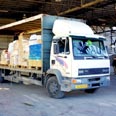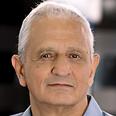A long, guarded motorcade accompanies his
Wolfensohn, a Jew by descent, an Australian by birth, an American by citizenship, finished his 10-year term as World Bank president two months ago. Before he made his way home, U.S. President George W. Bush offered him the position of White House and Quartet special envoy for disengagement.
His mission is to help get the Palestinians on their feet for the day after. The G8 Conference, which was cut short by the terror attack in London, budgeted for the project an annual sum of USD 3 billion. All this, or at least most of this, will pass through Wolfensohn's fingers.
On Monday he visited Nablus. Mofaz called.
What are you doing tonight? He asked.
I’m at the hotel, Wolfensohn replied.
Join me for the Maccabiah opening ceremony, Mofaz suggested.
He was unaware that Wofensohn had participated in the 1956 Melbourne Olympics as part of the Australian fencing team.
Wolfensohn went to the ceremony, and according to Mofaz, was touched by the event.
The following day Mofaz’s advisor, Brigadier General (reserves) Baruch Spiegel, showed Wolfensohn the wonders of the West Bank security fence from a helicopter window.
From above, the fence appears innocent, picturesque and carved like a Christo art display. Wolfensohn whipped out a list of annoying questions regarding the fence’s influence on Palestinian daily life.
At the new crossing built by the Defense Ministry at the Efraim Gate, facing Tul Karem, Wolfensohn walked along the opposite route, from Israel to the entrance to Tul Karem.
Traffic at the crossing was sparse - a few men who had arrived by themselves, merchants, most likely, and one elderly woman who cried out bitterly, as her crossing permit was set to expire the very same day. She said she planned to cross over into Israel to collect a salary she was owed for her work; if they would only let her pass, she would return by day’s end.
What’s the problem, I asked Lieutenant Colonel Fuad, the crossing’s commander.
Those whose permits expire usually remain in Israel, he explained. Then it is hard to track them down.
If Wolfensohn were a politician, he would make a story out of the woman. He quickly passed by the armored windows, the search booths, and the carousels.
How long does it take for a Palestinian to cross to the other side, he asks. Why don’t they allow cars to pass? What happens to the belongings they keep in their trunks?
This is not similar to a passageway between the U.S. and Canada, Fuad responded. This crossing was established mainly for security purposes.
With just one sentence Fuad confirmed the gap between the Israeli government’s viewpoint and that of its friends in America.
The Israelis are convinced the crossings they are currently constructing along the fence constitute a wondrous display of humanitarian grace. Instead of having to spend half the day in a never-ending line in front of a soldier, instead of having to wait for weeks until a container is permitted to pass, a pedestrian will wait at the crossing for 1-2 hours, and the merchandise will wait for no more than a day.
To this end Israel is investing NIS 2 billion (about USD 470 million) in the construction of new, spacious, advanced and acclimatized crossings.
The Israelis see a crossing; the Palestinians see a roadblock.
This week one of the Palestinian leaders told an Israeli politician in a private conversation that the roadblocks, or crossings issue is much more important to the Palestinians than the withdrawal from lands in the northern West Bank and Gush Katif.
The Americans ask: What is this thing, really? Is Israel building a real border separating Israel from the Palestinians, or is it trying to hold both ends of the stick - to leave and stay at the same time.
I have a question, Wolfensohn said. Will there be a customs station here?
Spiegel was embarrassed.
The matter is on the table, he said. There is no decision as of yet.
Miracle in the cabinet
Every crate of tomatoes, every strawberry, every chair that come out of Gaza or the West Bank into Israel is x-rayed. This level of security exists nowhere else in the world.
There is no technological innovation that has not been tried, and no device that officials have not considered purchasing.
At the Ashdod port, for example, there is a device for x-raying shipping containers, at a cost of USD 18 million, not including the special infrastructure built around it and maintenance and operational costs.
Now officials are seeking to purchase a similar device for the Karni crossing between the Gaza Strip and Israel.
This is the genuine price paid by Israel for dozens of years of gradual annexation. Indeed, the Palestinian dependency on Israel is absolute.
They have no outlet to the sea, Egypt, Jordan, or the airways. Everything has to pass through us. And everything that passes through us must be screened, even a shoelace, so as to avoid an outcry.
The United Nation’s branch tasked with mapping the territories counted 600 roadblocks placed there by Israel. The organization’s map is acceptable to the Americans.
Spiegel is negotiating with them in an effort to combine the maps. At the same time, he is attempting to ease the lives of Palestinians through the use of electronics.
In sections where the fence blocks Palestinian agricultural land, special crossings were established. The farmer, or school child, must wait for a soldier to come and unlock the gate. If a camera is placed there instead and the farmer is equipped with a biometrical identification card, perhaps he would be allowed to open the gate himself.
Spiegel shows Wolfensohn, from above, the new crossing between Israel and Jordan, in the Beit Shean Valley. Merchandize worth a billion dollars produced in Irbid, Jordan, are moved quickly and efficiently to the Haifa port.
Everything is x-rayed. This could also be worked out with the Palestinians, Spiegel says.
From the helicopter, Defense Ministry officials hurried to the cabinet meeting.
“We are asking for another USD 123 million to complete the crossings,” the director-general said. “Let the Americans first give us the USD 50 million they promised us,” Minister Haim Ramon said. “Start working, and then perhaps more money will come from the international community.”
“I fundraised in Japan and Spain,” Vice Premier Shimon Peres said.
“Yes,” said Sharon, “I’m hearing about billions. Thus far we haven’t seen a cent.”
In the room, something bordering on the miraculous took place - Sharon, Deputy Prime Minister Ehud Olmert, and Finance Minister Benjamin Netanyahu all agreed on something.
They agreed the world should pay, not the State of Israel.
“If they think we’re willing to pay, they won’t give us even one dollar,” Netanyahu said. “Let’s decide not to pay.”
And that was the decision. Happy and in good spirits, the ministers ended the meeting. An hour or two later, Ahmed Sami Khalil from the village of Atil near Tul Karem made his way to Netanya.
As of Wednesday, our forces did not know where and how he crossed into Israel, whether he chose a section where the fence has not yet been built, or through Jerusalem, or via one of the crossings.
Maybe he crossed five minutes away from Wolfensohn.
Two girls, two women, and an IDF soldier were killed in the Netanya attack. In terms of the public atmosphere, it was a “light" terror attack. Perhaps because of summer. Perhaps because of fears that the tourists who returned here will run away again. Perhaps because of London.
Outside Israel, the Netanya attack barely merited a footnote.
Defense Minister Shaul Mofaz would have liked to turn the terror attack into a milestone in the attitude toward the Islamic Jihad, to hit them in every which way, perhaps even renew the targeted killings.
He believes that it is better to charge at the Islamic Jihad now, before the disengagement. During the evacuation they would be able to cause much greater damage.
However, the public agenda has difficulties digesting two security issues in one bite.
On Wednesday, Sharon met with Wolfensohn.
What’s USD 120 million for you? Sharon asked. If you wish to help the Palestinian economy, the population, finance the crossings. We don’t want that money for ourselves. You know what? We don’t even want the money. Pay the contractors directly.
Wolfensohn said he would look into it.
Nahum Barnea is a columnist for Israel's leading newspaper Yedioth Ahronoth

















